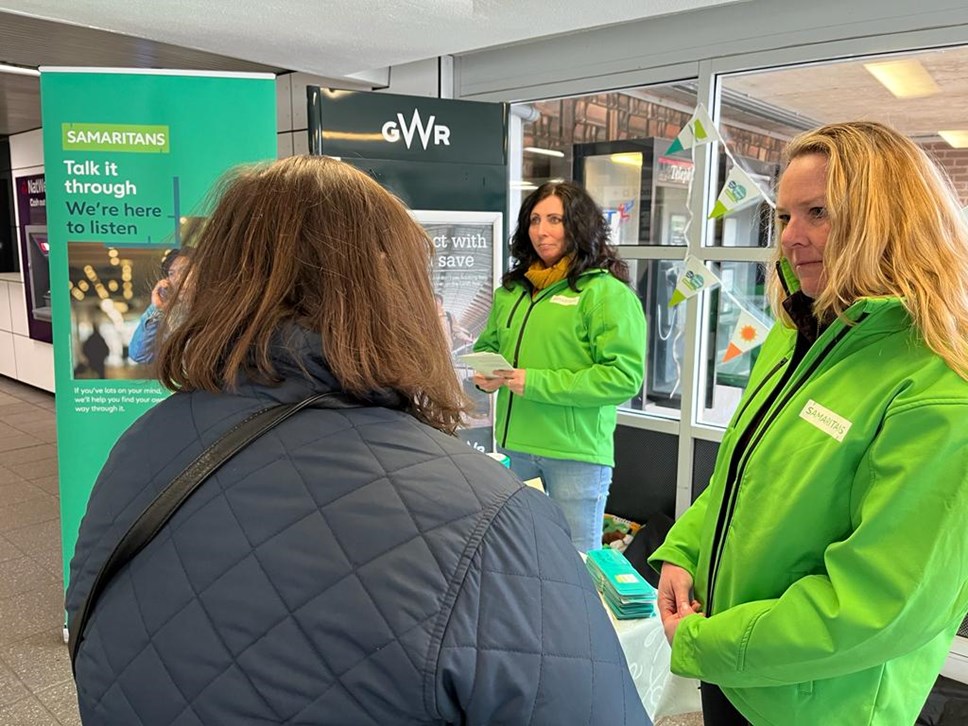
Samaritans calls for more investment in mental health support for rail workers
Suicide prevention charity Samaritans says vital investment from the rail industry is needed to ensure rail workers get adequate support for their mental health after a new report revealed almost one in five have suffered physical abuse at work.
With the rising cost of living and the increase in passengers returning to work, the people we rely on to keep our train services running need mental health support more than ever.
This Mental Health Awareness Week (Monday, May 15 – Sunday, May 21), Samaritans shares the findings of an industry-wide survey on mental health and wellbeing support in the rail industry.
A staggering two-thirds (66%) of rail staff said they had experienced a change in their mental health, which had impacted their ability to carry out their work. Many of those employees did not go to their organisation to seek help, with some feeling as though they couldn’t.
Last summer, researchers gathered evidence from 1,773 staff, which was conducted by Samaritans and Mental Health at Work, and funded by the Great Western Railway (GWR), with support from the Department for Transport (DfT).
Findings from the survey include:
- More than half of staff (57%) continued working despite experiencing a change in their mental health that impacted their ability to carry out their job, and 44% said they didn’t seek any support
- 65% did not seek help for their mental health through their organisation
- 61% said they had experienced verbal abuse with 19% even suffering physical abuse in their roles
- Almost a quarter of rail staff (23%) said they had reported being sick to their manager, when it was connected to their mental health
- Feedback on how the industry has taken positive action to raise awareness of mental health in the sector and support staff, such as providing platforms to hear from others who have experienced similar issues and introducing Mental Health First Aid training
The report also provides recommendations to achieve sustainable, pragmatic change across the rail industry focusing on key areas for improvement.
Olivia Cayley, Head of Rail Programme at Samaritans, said:
“This study highlights the range of barriers that rail staff experience when it comes to opening up about their mental health and seeking support that provides them with the right tools to feel better. We want leaders in the rail industry to recognise that change needs to happen now, with investment into mental health and wellbeing support to better protect staff, so people have the help when they need it most.”
Ruth Busby, People and Transformation Director at GWR and Network Rail Wales and Western, said:
“The wellbeing of our colleagues is so important, and this study is a further sign of our commitment to promoting an environment that supports positive mental health and colleagues experiencing trauma or mental illness.”
Peter Wilkinson, Managing Director of Passenger Services at DfT, said:
“Given the enormous challenges all our staff and managers face every day on this busy and demanding railway, the wellbeing of our colleagues needs to be taken every bit as seriously as we do railway safety.”
Alison Pay, Manging Director of Mental Health At Work, said:
“Investing in health and wellbeing should be a priority in any industry, but for the rail industry, where people are at the centre of the delivery, it is critical for success, safety and productivity, as well as the mental health of employees.
“This report has highlighted the key areas that very specifically impact mental health within the rail industry and the actions that can support employees moving forwards. It brings together the voice of the employee across all roles, alongside existing research and a review of the progress that has been made so far in this area. Implementing these changes at scale is inevitably challenging, but we now have a clear roadmap of the next steps and we hope that these compelling findings encourage all operators within this vital sector to begin the journey and make a difference to the working lives of the thousands of front line workers that keep both the country and the economy moving.”
Mental health-related absences have cost the sector over £1.3 billion since the start of 2019, and investing in staff mental health has proven to be cost-effective, with employers receiving an average £5 return for every £1 spent on wellbeing support.
Samaritans has developed a set of recommendations to help transform mental health access in the rail industry, which includes better trauma support, making sure all rail organisations cultivate an inclusive culture and encourage staff to identify and discuss mental health in their workplace.
For more information and to read the full report, click here: https://www.samaritans.org/how-we-can-help/workplace/rail-industry-suicide-prevention-programme/
Contact Information
John Carter
Media and Communications Manager
Great Western Railway
0845 410 4444
Notes to editors
About Samaritans
- Due to the proven link between certain types of media reporting of suicide and increases in suicide rates, please be mindful of Samaritans’ Media Guidelines for Reporting Suicide and Rail Suicide factsheet.
- Anyone can contact Samaritans for free any time from any phone on 116 123, which won’t show up on a phone bill, or email jo@samaritans.org or visit http://www.samaritans.org/
- Every 10 seconds, Samaritans respond to a call for help.
- Samaritans is a charity and it’s the public’s kind donations and 23,000 volunteers that mean we are always there for anyone struggling to cope. Find out how you can support us or volunteer with us.
- You can follow Samaritans on social media on Twitter, Facebook and Instagram.
About the survey - The survey was conducted by Samaritans and funded by Network Rail and Mental Health at Work.
- 1,773 staff from rail organisations across the UK responded to the survey.
About GWR
- First Greater Western Limited, trading as “Great Western Railway” (GWR), operates trains across the Great Western franchise area, which includes South Wales, the West Country, the Cotswolds, across southern England and into London. GWR provides high speed, commuter, regional and branch line train services, and before the covid-19 pandemic helped over 100 million passengers reach their destinations every year.
- GWR was awarded an extension to its direct award franchise (called DA3), which shall run up to 31 March 2023, with an option to extend for a further year.
- GWR signed up to The Railway Mental Health Charter (RMHC) at the beginning of the year. The charter provides a framework designed to help rail companies promote, manage and support mental wellbeing in the workforce.
About Mental Health at Work - Mental Health at Work’s mission is to improve working lives by influencing attitudes and behaviours around workplace mental health.
- We are a not for profit, community interest company, formed in 2015 and have been a wholly owned subsidiary of the Mental Health Foundation since 2018.
- We support organisations to build capability around the workplace mental health agenda. This supports natural and open conversations about mental health, helping to create rewarding, fulfilling and inclusive working environments.
- We do this through customised programmes, which include facilitated workshops and webinars, supported by digital learning and over the last year have worked within diverse industries across 42 markets.
- You can find out more about our work and how we could support your organisation by visiting us at www.mentalhealthatwork.com or emailing us at team@mentalhealthatwork.com
You can follow Mental Health at Work on social media on Linked In, Twitter, Facebook and Instagram
